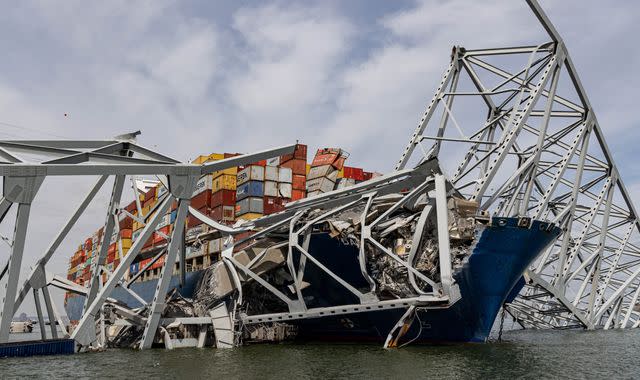Largest crane on US eastern seaboard drafted in to help clear Baltimore bridge and ship wreckage

The largest crane on the US eastern seaboard has been drafted in to help clear the wreckage of Baltimore's collapsed highway bridge.
The crane sits on a barge and can lift up to 1,000 tons, Maryland governor Wes Moore said on Friday.
It is one of at least two large cranes that will help clear the metal and concrete remains of the Francis Scott Key Bridge and the cargo ship Dali that hit it earlier this week.
Mr Moore said the "best minds in the world" were working on the issue, but added: "We have a very long road ahead of us.
"This is about the nation's economy - the port handles more cars and more farm equipment than any other port in America."
The cargo ship, almost as long as the Eiffel Tower is tall and carrying nearly 4,700 shipping containers, appears to have lost power before it struck a support pillar early on Tuesday.
After it hit the pillar it sent out a mayday call and dropped its anchors, buying time for authorities to clear the bridge of vehicles.
They did not have time, however, to warn a crew of pothole-fixing construction workers, who fell about 56m into 8C water.
On Wednesday, divers pulled the bodies of two crew members from inside a vehicle in the river, but authorities said they must clear some of the wreckage before being able to reach the bodies of four others.
The victims were from Mexico, Guatemala, Honduras and El Salvador.
Read more:
Wife of survivor says it's a 'miracle' husband survived'
Two possible causes for the Baltimore bridge catastrophe
The ship, owned by Grace Ocean Private Ltd and chartered by Danish shipping firm Maersk, was travelling from Baltimore to Sri Lanka. All but one of its 21 crew were from India and, apart from one person with minor injuries, they were unhurt.
Meanwhile, authorities are also concerned about possible environmental fall-out, testing water samples for contamination and monitoring the river for oil and other hazardous spills.
Some 56 of the ship's containers had hazardous materials but environmental experts are also worried the ship's fuel container could rupture.
Underwater barriers were built following reports from emergency workers of a sheen in the water near the site, although the Unified Command - which includes state agencies and the Coast Guard - said there was "no immediate threat" to the environment.
The river is vital for marine life and migratory birds moving north at this time of year, especially as it flows into Chesapeake Bay.


